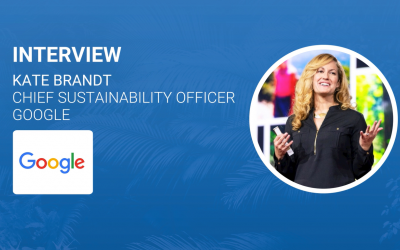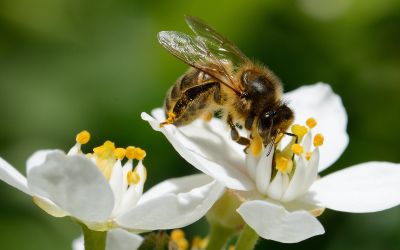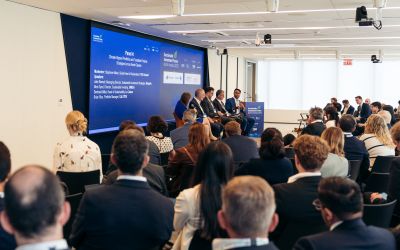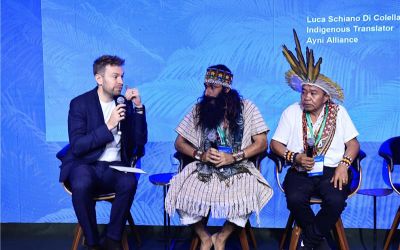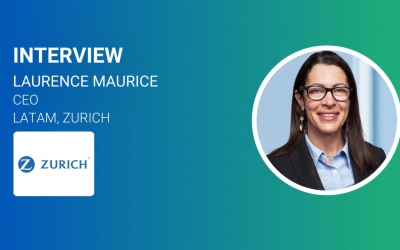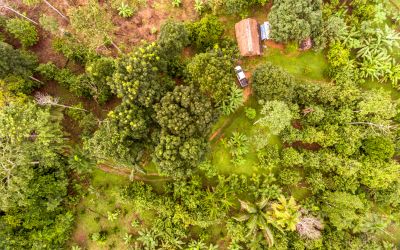Sabrina Kolbeck and Jacob Hamar on their motivation for sustainability
Ahead of the Sustainable Innovation Forum 2021, Climate Action caught up with Sabrina Kolbeck Controller and Jacob Hamar battery developer, at BMW Group, to discuss a new pilot project "PowerUp: Empowering Social Mobility” which is set to start in 2022.
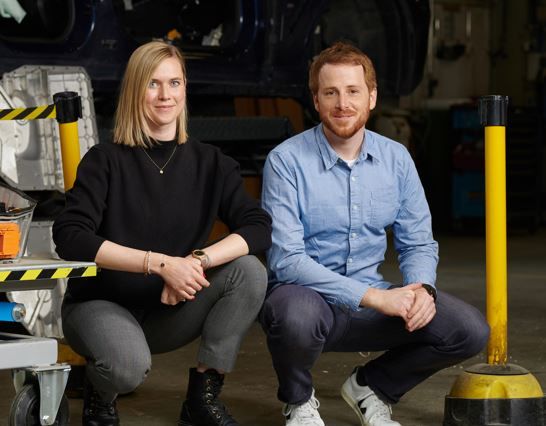
Ahead of the Sustainable Innovation Forum 2021, Climate Action caught up with Sabrina Kolbeck Controller and Jacob Hamar battery developer, at BMW Group, to discuss a new pilot project "PowerUp: Empowering Social Mobility” which is set to start in 2022.
Sabrina, Jacob, “PowerUp: Empowering Social Mobility” is all set to start in 2022 with a pilot project in a school in South Africa. Can you explain briefly what this is all about and what you plan to do?
Sabrina: We want to use the batteries from our development vehicles to supply social institutions worldwide with electricity from renewable energy sources. We came up with the idea over two years ago when Jacob and I took part in the BMW Group’s internal accelerator program on the topic of “Innovation for Impact”. As part of the project research, we realized that a huge number of electric vehicle batteries, which are almost as good as new, are sent for recycling practically unused after the test phase. As maintaining a secure energy supply is a real problem in many developing countries, we wanted to see if we could use these batteries to support social projects, while also saving CO2 at the same time. Because promoting education is so important, we will start by supplying primarily schools with electricity.
Jacob: Our batteries, along with electricity from renewable sources, will allow the schools to gain independence from often monopolistic energy providers. They will also have fewer problems with power outages and will be able to do without diesel generators. We are starting with a school near our BMW plant in Rosslyn, which we have been supporting for years. This is our pilot project. In the medium term, PowerUp will support a range of BMW Group CSR initiatives, many of which need a stable and sustainable energy supply. That’s exactly where we want to – and where we can – help.
How did the idea come about?
Jacob: I always wanted my work to have a social purpose. For that reason, I spent some time in a small town in Zimbabwe, Africa, as part of my work on my master’s dissertation. The town was the only one for kilometers with both a school and a hospital. We installed solar pumps there and quickly realized the incredibly positive impact reliable energy has on the economy and on the lives of those living there. We only installed some very small solar pumps and batteries with a capacity of 10 to 15 ampere hours – an i3 battery can manage 120 ampere hours. But even this could supply a small school or hospital with light and the bare necessities in terms of power. Still, it wasn’t easy to get a hold of such batteries.
Here at the BMW Group, I’ve found that there are a great deal of working automotive batteries from development vehicles that are no longer in use. Our goal is to set up a process whereby all functioning batteries, after their initial use in the company, are tested and safely transported to a social project for a second life.
Sabrina, you weren’t in Zimbabwe. What motivates you?
Sabrina: As well as having concerns about climate change, the refugee crisis in 2015 touched me enormously. People who leave their homeland because they can’t live there anymore, can’t survive there. Conversely, I’ve had the opportunity to explore the world and other countries but have always been able to return to my home country. I am well aware of just how good I have it and how privileged I am. I believe that privilege always comes with responsibility. That’s why I try to combine my travels with social engagement. Another motivation is that we could use our resources in such a way that there would be enough for everyone – but we don’t. That really inspires me and is something I want to change. Reduce, reuse, repair, recycle wherever possible. Our project “PowerUp: Empowering Social Mobility” does both. It focuses on reusing as well as recycling after use and on social engagement. That said, it’s not always as simple as it sounds now.
What exactly makes it hard?
Jacob: Safety first. Vehicle batteries and their technology are complex. We’re talking about high voltage currents here and you have to be careful with that. For example, PHEV batteries, the batteries for hybrid vehicles, aren’t designed for use in photovoltaic systems. Add to that an entirely new environment – think of the heat, the dust. We have to plan the process properly from start to finish. How do the batteries get to where they’ll be used? How environmentally friendly can we make the transport? How do they get back here for recycling once they’ve been used? Those are the challenges.
Sabrina: For us, having the combination in our team of Jacob as the engineer and me as the project manager was a great help. In general, we found that the vast majority of the knowledge our project needs can already be found in the company. We work with amazing colleagues. However, the initial lack of regular processes in place for our project made it difficult at times. But we’ve learned that it’s all worth it – and that not everything always has to be perfect right from the start or succeed right away.
Jacob: Whenever we present our project, people always approach us afterwards to offer their help. Sometimes that might be a potential collaborative project, sometimes support for specific steps in the project. We’re talking really practical offers of help. For example, a colleague from the logistics department might be able to help us get the right transport certificates, thus solving the issues around import.
Sabrina: This desire to help combined with every step we take forward spurs us on enormously. Our pilot project in South Africa has been delayed by the pandemic, but we’re almost ready to launch! We’ve secured the funding and approval and are all set to start in 2022. That’s such great news. And it doesn’t stop there! From the beginning of the 2030s, all new MINI vehicles will be all-electric. That means MINI is already testing the right and sustainable way to use batteries. Naturally, this is something we wholeheartedly support. We’re also currently planning another project in cooperation with our plant in Mexico, which involves equipping a school with a stationary battery, like in South Africa.
For me, that’s the ultimate success right now: we’re planning follow-up projects and I can see just how much we’re inspiring other people with our commitment. That’s something I’m really proud of.
So, PowerUp has a future ahead of it and you have a lot planned for the next few years. What other successes can you mention? And what have you learned from this as individuals?
Jacob: It’s been almost two years since we first presented our project. It took us a while to get anywhere. But we stuck with it, we persevered, and now it’s up and running! We’ve learned that sometimes it’s not the idea that’s the problem, but that it’s the wrong time or contact. If you can stick at it and believe in your goal, the right time will come at some point. Then you meet the right people, and it all works out. We also got the chance to present at One Young World in July.
Right. That took place in Munich this year. How did it go for you?
Sabrina: We presented our project as part of a BMW break-out session on the Circular Economy. Not only was it a great honor, but we also got to exchange ideas with a lot of like-minded people and left newly inspired. It was also mainly people with the same mindset, which gave us another real boost!
Jacob: I felt the exact same way. Generally, the whole event made a huge impression and the feedback on our presentation was great and really helpful. We also found new colleagues for the team. There really is a cross-functional PowerUp team emerging in the BMW Group right now.
Full speed ahead for PowerUp! Will you reach a point at which you say: “Right, we’ve done enough now”? When will you be satisfied with what you’ve achieved?
Jacob: My goal is to see our world developing in a positive direction and for all people to live a good life. I get to play a small part in this development and that gives me enormous satisfaction. But our work here will never be done.
Sabrina: Thinking beyond PowerUp, I will be satisfied and will have achieved my goal when all the SDGs* have been reached. But really, I’m convinced that change is the greatest constant in life and that there is always something new around the corner. When it comes to making the world that little bit better, I doubt the work ever comes to an end. That’s why we keep turning up day after day.
BMW Group are speaking at the Sustainable Innovation Forum 2021, to join them register here now.

